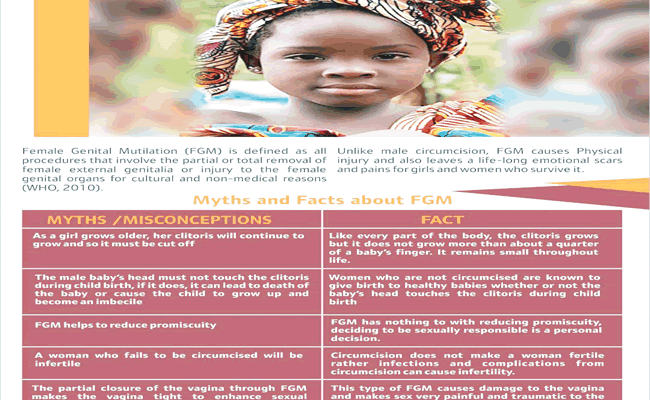By Yejide Gbenga-Ogundare
There have been continuous calls for more action in the fight against Female Genital Mutilation (FGM) as well as the need to take advocacy beyond a one-day international commemoration, considering the grave effects of FGM on victims and the seeming adamance on the part of perpetrators to uphold the act for cultural purposes or traditional myths.

FGM refers to any procedure involving partial or total removal of the external female genitalia or other injuries to the female genital organs for non-medical reasons. It damages anatomic structures that are directly involved in female sexual functions, and also affect women’s sexual health and well-being. Often, it creates eternal damage to victims
Last month, stakeholders renewed calls for an end to FGM as the world marked the International Day of Zero Tolerance for Female Genital Mutilation. And across board, while there were landmark achievements to celebrate, it was obvious that there is need to do more
For.more effectiveness, advocacy for an end to the practice of FGM must not be restricted to commemoration on identified international celebration days. There is a need for constant enlightenment which should not be targeted at women alone but also at men and decision makers in communities.

This is more important now following the warning from the United Nations International Children’s Emergency Fund (UNICEF) during the last International Day of Zero Tolerance for Female Genital Mutilation, that female genital mutilation is on the rise among Nigerian girls aged zero to 14.

According to UNICEF, the trend is worrying as the rate of mutilation has risen from 16.9 percent in 2013 to 19.2 percent in 2018 and currently, Nigeria has the third-highest number of women and girls who have undergone FGM worldwide, with an estimated 19.9 million survivors.
UNICEF emphasised that according to its projection, about four million girls are at risk of FGM this year (2023). This assertion by the international body reinforces the emergency situation of FGM in Nigeria and calls for a step-up in advocacy on FGM to help bring to an end or the barest minimum within a short period the harmful and rights violation act of FGM.
Why women are focused more during advocacy is that FGM, like other harmful cultural practices against women and girls including widowhood practices and forced marriages, is sometimes carried out by women, and it is prevalent in rural communities as a result of the fact that women in rural communities are mostly uneducated and uninformed.
For an effective campaign against female genital mutilation, it is important to carry men along in advocacy because they are the fathers of victims and husbands that marry them and suffer the effects with them. There is need for collaborative efforts to achieve success and everyone has a role to play.
For success, everyone must show commitment like the one showed by Jaha Dukureh, the UN Women Goodwill Ambassador for Africa who is a renowned activist and a survivor of female genital mutilation (FGM) and child marriage, when she said “As long as I am alive, I will wake up every single day and scream to the world that FGM is wrong, and scream to the world that child marriage is not different from rape. We all have a moral obligation to ensure that violence against women ends. We can do this through advocacy. We can do this through individual work. We cannot stay silent.
We need to ensure that we are supporting communities to lead that change themselves. Because if we do anything other than get communities to lead the change themselves, 20 years from now, 30 years from now, we will be back in the same communities talking about ending FGM, ending violence against women and girls and all these things we have been talking about for decades.”
It is important to work hand in hand with traditional leaders who understand the traditions and understand that tradition is not static and cultures change. It will take coordinated, holistic approaches.
READ ALSO FROM NIGERIAN TRIBUNE








